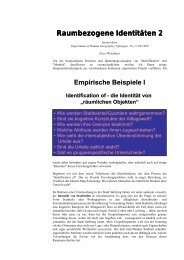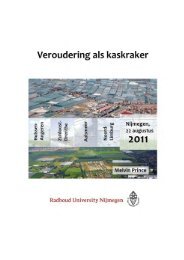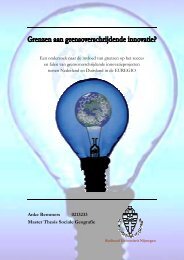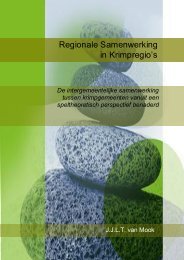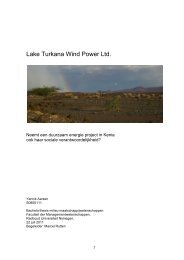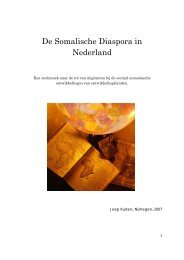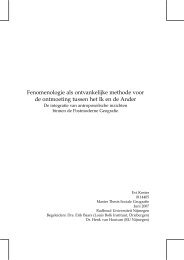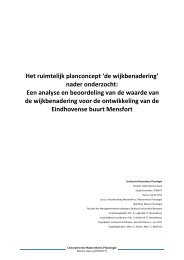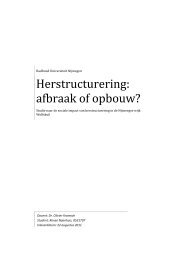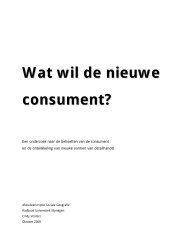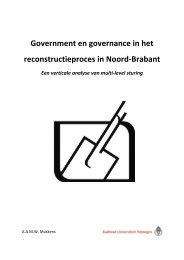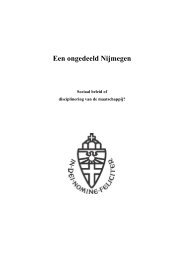Trading with the enemy in Mitrovica, Kosovo. - RUhosting
Trading with the enemy in Mitrovica, Kosovo. - RUhosting
Trading with the enemy in Mitrovica, Kosovo. - RUhosting
You also want an ePaper? Increase the reach of your titles
YUMPU automatically turns print PDFs into web optimized ePapers that Google loves.
CHAPTER 3: THEORETICAL FRAMEWORK<br />
"Peace is <strong>the</strong> natural effect of trade. Two nations who<br />
traffic <strong>with</strong> each o<strong>the</strong>r become reciprocally dependent: for<br />
if one has <strong>the</strong> <strong>in</strong>terest <strong>in</strong> buy<strong>in</strong>g, <strong>the</strong> o<strong>the</strong>r has <strong>the</strong> <strong>in</strong>terest<br />
<strong>in</strong> sell<strong>in</strong>g; and thus <strong>the</strong>ir union is founded on <strong>the</strong> mutual<br />
necessities".<br />
-Montesquieu (1900: 316)<br />
This chapter focuses on <strong>the</strong> <strong>the</strong>oretical framework used <strong>in</strong> this research. The ma<strong>in</strong> scientific foundation is <strong>the</strong><br />
trade aspect of <strong>the</strong> Kantian Peace <strong>the</strong>ory, also known as <strong>the</strong> liberal peace or simply as <strong>the</strong> "trade br<strong>in</strong>gs<br />
peace" concept, which will be discussed <strong>in</strong> <strong>the</strong> first paragraph. The second paragraph will discuss trade <strong>in</strong><br />
(post) conflict areas and how <strong>the</strong> effects of illegal trade may be different from legal trade regard<strong>in</strong>g <strong>in</strong>tergroup<br />
relations. The third and last paragraph of this chapter exam<strong>in</strong>es some po<strong>in</strong>ts of attention which are<br />
needed when apply<strong>in</strong>g <strong>the</strong>se <strong>the</strong>ories on <strong>the</strong> specific case of <strong>Mitrovica</strong>.<br />
3.1. The Kantian Peace<br />
The claim that “trade br<strong>in</strong>gs peace” can be dated back as far as to <strong>the</strong> classical Greeks, but especially ga<strong>in</strong>ed<br />
<strong>in</strong> popularity dur<strong>in</strong>g <strong>the</strong> 19 th century. Nowadays it's a ma<strong>in</strong>stream ideology supported by a wealth of<br />
empirical data (Keshk, Poll<strong>in</strong>s & Reuveny, 2004). Oneal and Russet (1999) show that many research reports<br />
<strong>in</strong> <strong>the</strong> 1990s have <strong>in</strong>dicated that “economically important trade has statistically significant and substantively<br />
important benefits for reduc<strong>in</strong>g <strong>in</strong>terstate violence”. To this <strong>the</strong>y add <strong>the</strong>ir own research results which shows<br />
abundant support for this case.<br />
The notion that trade fosters peace is perhaps best known as a part of <strong>the</strong> concept also known as '<strong>the</strong> Kantian<br />
Peace'. This <strong>the</strong>ory – based on Immanuel Kant's <strong>the</strong>ory about a perpetual peace – holds that <strong>the</strong>re are three<br />
important factors which reduce <strong>the</strong> chances of war for a country: membership <strong>in</strong> <strong>in</strong>tergovernmental<br />
organisations, a democratic system and levels of trade caus<strong>in</strong>g economic <strong>in</strong>terdependence. When focussed on<br />
<strong>the</strong> effect of trade and democracy on peace this <strong>the</strong>ory is often referred to as 'liberal peace'. The empirical<br />
evidence for this <strong>the</strong>ory is strong <strong>with</strong> only a few 'marg<strong>in</strong>al' cases of war between democracies accord<strong>in</strong>g to<br />
its supporters. The general consensus is that all three of <strong>the</strong>se variables have a positive effect on peace but<br />
also affect each o<strong>the</strong>r positively. For example, <strong>the</strong> effect of trade would have a positive effect on a country's<br />
economy which is good for <strong>the</strong> entire population, but it would most directly affect <strong>the</strong> traders who earn <strong>the</strong>ir<br />
bread <strong>with</strong> it directly. In a democracy this group of traders would be more able to voice <strong>the</strong>ir concerns<br />
aga<strong>in</strong>st los<strong>in</strong>g trade if a war would erupt and could <strong>in</strong>fluence policies.<br />
Lagazio & Russett (2004) developed a model which predicts conflicts over <strong>the</strong> period 1885-1992 <strong>with</strong> an<br />
accuracy rang<strong>in</strong>g from 64.8% - 82.4%, <strong>in</strong> which <strong>the</strong>y f<strong>in</strong>d a consistent strong effect for <strong>in</strong>terdependence and<br />
democracy, and a lesser but still significant effect for membership of <strong>in</strong>ternational organisations. The same<br />
18



